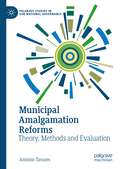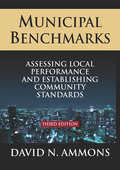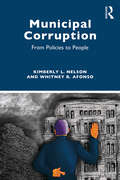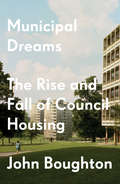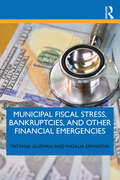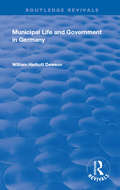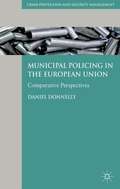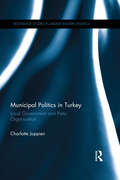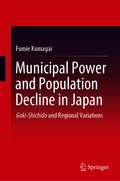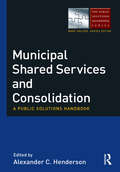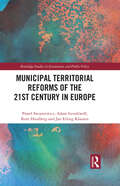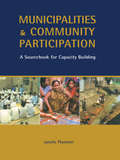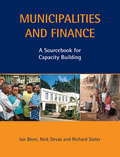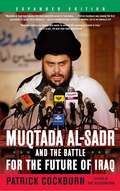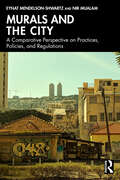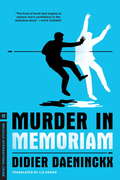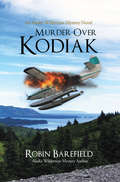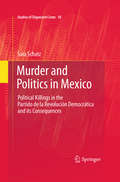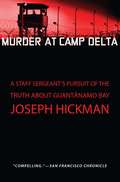- Table View
- List View
Munich: A novel
by Robert HarrisFrom the internationally best-selling author of Fatherland and the Cicero Trilogy--a new spy thriller about treason and conscience, loyalty and betrayal, set against the backdrop of the fateful Munich Conference of September 1938.Hugh Legat is a rising star of the British diplomatic service, serving at 10 Downing Street as a private secretary to the Prime Minister, Neville Chamberlain. Rikard von Holz is on the staff of the German Foreign Office--and secretly a member of the anti-Hitler resistance. The two men were friends at Oxford in the 1920s, but have not been in contact since. Now, when Hugh flies with Chamberlain from London to Munich, and Rikard travels on Hitler's train overnight from Berlin, their paths are set on a disastrous collision course. And once again, Robert Harris gives us actual events of historical importance--here are Hitler, Chamberlain, Mussolini, Daladier--at the heart of an electrifying, unputdownable novel.
Municipal Amalgamation Reforms: Theory, Methods and Evaluation (Palgrave Studies in Sub-National Governance)
by António TavaresThis book provides a comprehensive analysis of municipal amalgamation reforms in Europe. Adopting the analytical and methodological tools of comparative historical analysis, it examines how the history of local government systems has conditioned the adoption of municipal amalgamation reforms across time and space. Beginning with Sweden’s early amalgamation reforms during the late 1940s and early 1950s, it assesses how the evolution of the Welfare State, decentralization, urbanization, and economic growth have all impacted amalgamation reforms in ten other European countries. The book challenges the prevailing theory that amalgamations are implemented by rational design to improve the efficiency and capacity of local governments. Instead, it argues that state sovereignty, regime changes, centralization of authority and diffusion effects are more likely causes of the adoption of municipal amalgamation reforms. It will appeal to all those interested in public administration, public policy, European politics, and local governance studies.
Municipal Benchmarks: Assessing Local Performance and Establishing Community Standards
by David AmmonsCompletely updated with new listings and statistics throughout, this comprehensive resource goes beyond the current literature on local government performance measurement and provides benchmarks on more than 40 key topics against which performance can be assessed in all areas of operation. "Ammons has assembled a remarkable volume of benchmark data for a comprehensive range of municipal government services. Municipal Benchmarks will be of considerable help for municipalities in laying the groundwork for an accountable government." - Harry Hatry, The Urban Institute "I am delighted to see that ideas for advancing our industry are alive and thriving. Ammons's collection does an incredible service to every municipal manager in the country, and perhaps the world. These benchmarks clearly set standardized ways of looking at measuring the performance of municipal service delivery." - Ted Gaebler, City Manager, Rancho Cordoba, CA (co-author of Reinventing Government)
Municipal Corruption: From Policies to People
by Kimberly L. Nelson Whitney B. AfonsoThis book represents the most comprehensive exploration of corruption in U.S. municipal governments written to date.Exploring the 30-year time period from 1990 to 2020 and including all U.S. municipalities with populations of 10,000 people or more, Municipal Corruption: From Policies to People uses both quantitative research and case study analysis to answer the question of why some municipalities fall victim to corrupt acts, while others do not. It tells the stories of a number of communities that suffered through public corruption, investigating factors that contribute to a greater risk of corruption in municipalities, and identifying steps to prevent corruption in communities—including strengthening resident interest and involvement in local affairs, offsetting the decline in local journalism, and reinforcing scrutiny by state governments.Municipal Corruption is ideal supplemental reading for courses on ethics, public affairs, local government, and urban affairs, and it will be immeasurably useful to municipalities considering how to better insulate themselves and their constituents from corrupt acts.
Municipal Dreams: The Rise and Fall of Council Housing
by John BoughtonA narrative history of council housing—from slums to the Grenfell TowerUrgent, timely and compelling, Municipal Dreams brilliantly brings the national story of housing to life. In this landmark reappraisal of council housing, historian John Boughton presents an alternative history of Britain. Rooted in the ambition to end slum living, and the ideals of those who would build a new society, Municipal Dreams looks at how the state’s duty to house its people decently became central to our politics. The book makes it clear why that legacy and its promise should be defended. Traversing the nation in this comprehensive social, political and architectural history of council housing, Boughton offers a tour of some of the best and most remarkable of our housing estates—some happily ordinary, some judged notorious. He asks us to understand their complex story and to rethink our prejudices. His accounts include extraordinary planners and architects who wished to elevate working men and women through design; the competing ideologies that have promoted state housing and condemned it; the economic factors that have always constrained our housing ideals; the crisis wrought by Right to Buy; and the evolving controversies around regeneration. Boughton shows how losing the dream of good housing has weakened our community and hurt its most vulnerable—as was seen most catastrophically in the fire at Grenfell Tower.
Municipal Fiscal Stress, Bankruptcies, and Other Financial Emergencies
by Tatyana Guzman Natalia ErmasovaIt is difficult to find someone who has not heard about the Puerto Rico, Detroit, Michigan, or Orange County, California, bankruptcies. While guides for responsibly managing government finances exist, problems often originate not because of poor financial reporting or financial deficiencies but because issues external to financial wellbeing arise, such as economic, demographic, political, legal, or even environmental factors. Exacerbating the problem, there is not much advice in the existing literature on how to act when municipalities face financial struggles. Filling this important gap, this book explores fiscal health and fiscal hardships, municipal defaults and bankruptcies, and many other aspects to help guide local governments during fiscal distress. Fiscal hardships negatively affect the quality and availability of public goods and services and, consequently, the wellbeing of residents and businesses living and working in distressed municipalities. Turned off streetlights, unmaintained public parks, potholes, inconsistent garbage pickup, longer response time from emergency services, and multiple other issues that residents of the struggling municipalities deal with, lead to higher crime rates, lower quality of K-12 education, dangerous road conditions, lower housing values, outmigration of wealthier population, and numerous other problems. The COVID-19 pandemic put additional unprecedented pressure on municipal finances nationwide. In this book authors Tatyana Guzman and Natalia Ermasova evaluate distressed cities and municipalities and provide practical recommendations on improving their financial conditions. What are conditions and signs to look for to not to find yourself in similar situations? What can be done if your municipality is already experiencing fiscal hardships? What are the consequences of fiscal misfortunes? How does one exit a fiscal emergency? This book answers these and other questions and serves as a guide to fiscal health and prosperity for U.S. municipal governments, students and researchers in public finance, and general public management fields.
Municipal Life and Government in Germany (Routledge Revivals)
by William Harbutt DawsonFirst published in 1914, in various writings on German life and institutions, Dawson has touched upon isolated aspects of the subject of municipal government. The book, as its title explains, is concerned solely with questions of urban administration, yet without the limitation which the use of the word "municipal" might seem to suggest. The larger German cities and towns correspond for all practical purposes to the municipalities of the United Kingdom, as the smaller German towns correspond to the urban districts.
Municipal Policing in the European Union
by Daniel DonnellyThe book applies a model of municipal policing to compare a number of police systems in the European Union suggesting that in the future local communities will have some form of police enforcement mechanism that will not always include the sworn police officer.
Municipal Politics in Turkey: Local Government and Party Organisation (Routledge Studies in Middle Eastern Politics)
by Charlotte JoppienThere is a large and growing literature on Turkish politics in general, and the AKP in particular. However, local government and party organization, although very important topics, are strikingly understudied. This book compares local politics in two Central Anatolian cities, Konya and Eskişehir, ruled by different governmental parties, the AKP in Konya and the CHP in Eskişehir. It analyzes how national political parties adapt to local contexts (‘culture of everyday politics’) and how they seek to influence local culture (‘politics of everyday culture’). By examining how municipal politics is practiced on a daily basis, it illuminates more fundamental aspects of Turkish politics such as political mobilization, establishing links between voters and politicians, various practices of decision-making and the role of civil society. All of this has been critical for the AKP’s continuous electoral success since 2002. The findings are based on over 1.5 years of fieldwork in the two cities, as well as over 50 interviews with national and local political actors. The main fields of research are mayoral biographies, municipal practices, particularly with regard to welfare and service provision, the cooperation with other municipal actors as political parties or civil society organizations; urban planning activities and cultural policy. The study helps to comprehend more fundamental aspects of Turkish politics such as political mobilization, the establishing of links between voters, municipalities and parties as well as decision-making processes. Municipal Politics in Turkey fills a gap in existing literature by illuminating the fundamental aspects of Turkish politics, such as political mobilization, the establishing of links between voters, municipalities and parties as well as decision-making processes. It will be a valuable resource for students and scholars interested in Turkish Politics and political parties, municipal/local politics and comparative politics.
Municipal Power and Population Decline in Japan: Goki-Shichido and Regional Variations
by Fumie KumagaiThis book provides an insightful sociological study of the declining Japanese population, using statistical analysis to establish the significance of municipal power using demographic data on national, regional, prefectural and municipal levels. Penned by one of Japan's eminent sociologists, it provides a quantitative characterization of population decline in Japan with a focus on regional variation, and identifies the principal explanatory factors through GPI statistical software tools such as G-census and EvaCva, within a historical perspective. Furthermore, it offers a qualitative assessment of what constitutes ‘municipal power’ as this relates to regional/local revitalization as a means of addressing municipal population decline. Using Goki-Shichido as a theoretical framework, this book pays special attention to municipal variations within the same prefecture, presenting a completely unique approach. In combining these two dimensions of analyses, the book successfully reveals the impact of municipal power and socio-cultural identity of social capital in the region, from both quantitative and qualitative perspectives at the municipal level. Demography issues in Japan have been receiving increasing attention among researchers given the growing number of declining populations in developed countries, in tandem with rapid aging and low fertility trends. Providing an original and unique contribution to regional population analysis in the fields of regional demography, historical demography and regional population policy, this book shows that the revitalization of the community is vital if Japan is to increase its population, so as to renew a community ‘raison d'être’. The book is of interest to scholars of Asian studies more broadly, and to sociologists, demographers, and policymakers interested in population studies, specifically."Providing an informative and vivid overview of the demographic situation of Japan, the author offers excellent suggestions for effective regional policy in confronting a shrinking society. This book presents a unique analysis of the regional variations on small municipal levels, with demographic variables, social indicators and historical identities. An original contribution to regional population analysis in the fields of regional population policy, regional demography and historical demography."- Toshihiko Hara, Professor Emeritus, Sapporo City University
Municipal Shared Services and Consolidation: A Public Solutions Handbook (The Public Solutions Handbook Series)
by Alexander HendersonMunicipal Shared Services and Consolidation provides a comprehensive and clear review of the theories and practices of structuring and managing complex local government services. Intended for both students and practitioners, this volume in the Public Solutions Handbook Series addresses concepts and processes of shaping collaborative arrangements in public service with goals of effectiveness and efficiency in mind. The Handbook begins with a review of theories of shared services and consolidation, highlighting conceptual foundations, practical barriers, and cultural considerations related to these efforts. Specific, practical advice follows, highlighting the processes of creating, implementing, and managing shared services and consolidation agreements. Municipal Shared Services and Consolidation is exceptionally well written and is amplified by examples, cases, illustrations, and a comprehensive bibliography.
Municipal Solid Waste Landfill Technology in Japan (Environmental Science and Engineering)
by Sotaro HiguchiJapan was ahead of the rest of the world when it introduced intermediate processing of municipal waste by such means as incineration in the 1960s. Owing to the small land area of the country and the difficulty in securing landfill sites, the incineration ratio of municipal combustible waste had reached 100% by the 1990s. Along with the landfill of incineration residues, proprietary technologies such as high salt leachate treatment, desalination treatment, by-product recycling, a focus on the resource of incineration residues, sea surface landfill sites, and covered type landfill sites have spread and developed since then. This book describes the introduction of incineration facilities starting in the 1960s, landfill technology, and issues arising after 1990 following the introduction of the facilities. The necessity of a total system from incineration to landfill is explained as well. The volume is a valuable resource for countries that plan to introduce intermediate processing such as incineration and for countries that are developing a waste management policy.
Municipal Territorial Reforms of the 21st Century in Europe (Routledge Studies in Governance and Public Policy)
by Paweł Swianiewicz Adam Gendźwiłł Kurt Houlberg Jan Erling KlausenThis book provides a comprehensive and up-to-date picture of territorial change on the municipal level across all European countries. Taking a thematic and comparative perspective, the book builds on extensive quantitative data and a large survey of academic experts in 33 European countries. Territorial organization of the municipal level in Europe is strongly diversified and yet far from stable. Politically speaking, territorial reforms tend to be risky and difficult, as such changes affect vital interests and identities. Despite such difficulties, the last two decades have witnessed considerable changes in territorial divisions at the municipal level across a range of European countries. In this book, the authors describe and analyze these changes comprehensively, making a vital contribution to understanding the reasons and dynamics of territorial reform processes. This book will be of key interest to scholars, students and practitioners in local or sub-national government, institutional design and more broadly to political science, public administration/policy, human geography, sociology and economics.
Municipalities and Community Participation: A Sourcebook for Capacity Building (Municipal Capacity Building Series)
by Janelle Plummer'Among all the literature on participation, this is the first book I know that focuses on municipal authorities. It... also has particular importance both for higher levels of government (at national or provincial/state level) and for international agencies. Firstly, it is a reminder of the importance of well-functioning municipal governments for reducing poverty. Secondly, it is a rich source of case studies and analysis about how municipal authorities can incorporate one central component of 'good governance' - a permanent, participatory engagement with their citizens' From the Foreword by David Satterthwaite, Director, Human Settlements Programme, International Institute for Environment and Development Increasingly, governments and donors are advocating the participation of poor communities in the delivery of urban services and infrastructure. Yet local authorities responsible for implementing participatory policies often do not have the skills, organisations or resources needed, or an adequate idea of the capacity required. This sourcebook provides invaluable practical guidance for municipal officials, and others working in urban development and poverty reduction, on the range of issues to be addressed in planning and managing cities with community participation. It explains the key elements of participation, identifies common constraints and opportunities, describes the vehicles for moving participation forward and outlines the capacity building needed for a municipality to achieve participatory goals.
Municipalities and Finance: A Sourcebook for Capacity Building (Municipal Capacity Building Series)
by Nick Devas Ian Blore Richard SlaterFinance is a critical issue for municipal governments around the world, and a major constraint on the delivery of pro-poor services at the local level. In many countries, decentralisation has brought the issue of municipal finance to the fore. This sourcebook provides a framework for analysing municipal finance capacity and ways of addressing financial constraints. The ideas come from real-life innovative practice in four countries - India, Brazil, Kenya and Uganda - with additional examples from elsewhere. Emphasis is given to how those innovations and improvements were developed and sustained. The book identifies a strategic framework for diagnosing municipal finance capacity and focusing financial goals. It applies the analysis to a number of critical areas of municipal finance including local taxes, charges for services, budgeting, cost control, accounting reforms and investment finance. This is the third in a series of capacity-building sourcebooks that includes Focusing Partnerships: A Sourcebook for Municipal Capacity Building in Public-Private Partnerships and Municipalities and Community Participation: A Sourcebook for Capacity Building.
Muqtada Al-Sadr and the Battle for the Future of Iraq
by Patrick CockburnTimemagazine listed him as one of its "100 People Who Shape Our World. " Newsweek featured him on its cover under the headline "How Al-Sadr May Control U. S. Fate in Iraq. " Paul Bremer denounced him as a "Bolshevik Islamist" and ordered that he be captured "dead or alive. " Who is Muqtada al-Sadr, and why is he so vital to the future of Iraq and, arguably, the entire Middle East?In this compellingly readable account, prize-winning journalist Patrick Cockburn tells the story of Muqtada's rise to become the leader of Iraq's poor Shi'ites and the resistance to the occupation. Cockburn looks at the killings by Saddam's executioners and hit men of the young cleric's father, two brothers, and father-in-law; his leadership of the seventy-thousand-strong Mehdi Army; the fierce rivalries between him and other Shia religious leaders; his complex relationship with the Iraqi government; and his frequent confrontations with the American military, including battles that took place in Najaf in 2004. The portrait that emerges is of a complex man and a sophisticated politician, who engages with religious and nationalist aspirations in a manner unlike any other Iraqi leader. Cockburn, who was among the very few Western journalists to remain in Baghdad during the Gulf War and has been an intrepid reporter of Iraq ever since, draws on his extensive firsthand experience in the country to produce a book that is richly interwoven with the voices of Iraqis themselves. His personal encounters with the Mehdi Army include a tense occasion when he was nearly killed at a roadblock outside the city of Kufa. Though it often reads like an adventure story,Muqtadais also a work of painstaking research and measured analysis that leads to a deeper understanding both of one of the most critical conflicts in the world today and of the man who may well be a decisive voice in determining the future of Iraq when the Americans eventually leave.
Muqtada: Muqtada Al-sadr, the Shia Revival, and the Struggle for Iraq
by Patrick CockburnTime magazine listed him as one of its "100 People Who Shape Our World." Newsweek featured him on its cover under the headline "How Al-Sadr May Control U.S. Fate in Iraq." Paul Bremer denounced him as a "Bolshevik Islamist" and ordered that he be captured "dead or alive." Who is Muqtada al-Sadr, and why is he so vital to the future of Iraq and, arguably, the entire Middle East? In this compellingly readable account, prize-winning journalist Patrick Cockburn tells the story of Muqtada's rise to become the leader of Iraq's poor Shi'ites and the resistance to the occupation. Cockburn looks at the killings by Saddam's executioners and hit men of the young cleric's father, two brothers, and father-in-law; his leadership of the seventy-thousand-strong Mehdi Army; the fierce rivalries between him and other Shia religious leaders; his complex relationship with the Iraqi government; and his frequent confrontations with the American military, including battles that took place in Najaf in 2004. The portrait that emerges is of a complex man and a sophisticated politician, who engages with religious and nationalist aspirations in a manner unlike any other Iraqi leader. Cockburn, who was among the very few Western journalists to remain in Baghdad during the Gulf War and has been an intrepid reporter of Iraq ever since, draws on his extensive firsthand experience in the country to produce a book that is richly interwoven with the voices of Iraqis themselves. His personal encounters with the Mehdi Army include a tense occasion when he was nearly killed at a roadblock outside the city of Kufa. Though it often reads like an adventure story, Muqtada is also a work of painstaking research and measured analysis that leads to a deeper understanding both of one of the most critical conflicts in the world today and of the man who may well be a decisive voice in determining the future of Iraq when the Americans eventually leave.
Murals and the City: A Comparative Perspective on Practices, Policies, and Regulations
by Eynat Mendelson-Shwartz Nir MualamThis book provides a cross-urban account on murals, street art, and public art in cities around the globe. It reviews the rules, policies, and regulations that frame how murals and street art are managed across a range of cities and contexts. Murals and street art serve as dynamic stages for communities and individuals with multiple and sometimes opposing identities, with the potential to cause disturbance and conflict. The book investigates the challenges they present to cities and city administrations, and the policies and practices that are crafted to address them. The global landscape of today's mural policies is discussed comparatively across a range of cities, and the impact of written rules, unofficial practices, and institutional arrangements on city spaces, walls, and surfaces is examined. An important contribution to this growing field, the book will appeal to students, practitioners, and scholars with an interest in public art, municipal governance, public space management, cultural policy, and urban design.
Murder In Memoriam
by Didier Daeninckx Liz HeronOn the evening of October 17, 1961 twenty-thousand Algerians marched in Paris in defiance of and in protest against a curfew imposed by Maurice Papon, chief of the Paris Metropolitan Police. The protesters were met with ferocious and uninhibited violence. Eleven-thousand were arrested; more than one thousand injured; as many as three hundred were killed, many of them thrown into the Seine, from which their bodies were later recovered.In recreating the scene of the atrocities in Murder in Memoriam, his controversial alarum first published in 1984, Didier Daeninckx introduces a fictional observer of the riot, Roger Thiraud, a middle-aged history teacher in a public school, only steps from his home and his waiting, pregnant wife. In the first few minutes of the demonstration, he will be assassinated, in cold blood, by a member of the anti-terrorist secret police.For nearly forty years after October 1961, France would deny the killings. Upon the independence of Algeria in 1962 an amnesty put its perpetrators safely beyond prosecution. The records were buried.In 1981, Bernard Thiraud, Roger's son, is researching the archives in Toulouse, intent on completing his father's history of his birthplace, Drancy, now notorious as the site of a detention and transit camp from which Jews were deported to Auschwitz. One afternoon, after leaving the town hall, he too is murdered -- the victim of what appears to investigating officers to be a professional killing. When inspector Cadin of the Toulouse prefecture learns of the unsolved murder of the young man's father, he suspects a connection. But why would anybody want to kill two bourgeois, politically unconnected history teachers?Didier Daeninckx has located the link between the two murders in the history that France had yet to confront -- in its colonial racism and its complicity in genocide. Daeninckx made this connection in fiction, deliberately provoking its acknowledgment in fact. Murder in Memoriam anticipated by more than a decade the shocking revelations provided by the exposure, trial, and conviction of Maurice Papon -- the Parisian chief of police in 1961, and the never-named villain whose real crimes, unrevealed at the time of its first publication, haunt this account -- for crimes against humanity; for his part in the administration of the deportation of the Jews from Bordeaux to Auschwitz.From the Trade Paperback edition.
Murder Over Kodiak: An Alaska Wilderness Mystery Novel
by Barefield RobinWhen a floatplane mysteriously explodes above the Alaska wilderness, investigators begin digging into the lives of the five passengers and the pilot. Was the target of the bomb the U.S. senator in the midst of a hotly contended re-election campaign or her husband, a corporate raider with no shortage of enemies? Or could the bomb have been meant for the cannery owner involved in a contentious divorce, or the refuge manager who has a long list of adversaries, including one who has vowed to get even with him. Even the pilot could have been the target, since his girlfriend has violent tendencies and knows how to use explosives. Dr. Jane Marcus is determined to find who murdered her young assistant and the other passengers and the pilot of the floatplane, but when her own life is threatened, she knows she must and the murderer, before she becomes the next victim.
Murder and Politics in Mexico
by Sara SchatzMurder and Politics in Mexico studies the causes of political killings in Mexico's liberalization-democratization within the larger context of political repression. Mexico's democratization process has entailed a little known but highly significant cost of human lives in pre- and post-election violence. The majority of these crimes remain in a state of impunity: in other words, no person had been charged with the crime and/or no investigation of it had occurred. This has several consequences for Mexican politics: when the level of violence is extreme and when political killings that are systematic and invasive are involved, this could indicate a real fracture in the democratic system. This book analyzes several dimensions regarding impunity and political crime, more specifically, the political killings of members of the PRD in the post-1988 period in Mexico. The main argument proposed in this book is that impunity for political killings is a structured system requiring one central precondition, namely the failure of the legal system to function as a system of restraint for killings. Dr Schatz's research finds that political assassinations are indeed rational, targeted actions but they do not occur within an institutional vacuum. Political assassinations are calculated strategies of action aimed at eliminating political rivals. As a form of interpersonal violence, political assassination involves direct or implied authorization from political leaders, the availability of assassins for hire and the willingness of some political leaders to utilize them against political opponents, and violent interactions between political parties combined with judicial system ineffectiveness. A corrupt legal system facilitates the use of political assassination and explains the persistence of impunity for political murder over time. To reduce political violence in the transition to electoral democracy, specific institutional conditions, namely a structured system of impunity for murder, must be overcome.
Murder at Camp Delta
by Joseph HickmanThe revelatory eyewitness account about Guantánamo Bay--detainees murdered, a secret CIA facility for torture, and the US government cover up--by the Staff Sergeant who felt honor-bound to uncover it.Staff Sergeant Joe Hickman was a loyal member of the armed forces and a proud American patriot. For twenty years, he worked as a prison guard, a private investigator, and in the military, earning more than twenty commendations and awards. When he re-enlisted after 9/11, he served as a team leader and Sergeant of the Guard in Guantánamo Naval Base. From the moment he arrived at Camp Delta, something was amiss. The prisons were chaotic, detainees were abused, and Hickman uncovered by accident a secret facility he labeled "Camp No." On June 9, 2006, the night Hickman was on duty, three prisoners died, supposed suicides, and Hickman knew something was seriously wrong. So began his epic search for the truth, an odyssey that would lead him to conclude that the US government was using Guantánamo not just as a prison, but as a training ground for interrogators to test advanced torture techniques. For the first time, Hickman details the inner workings of Camp Delta: the events surrounding the death of three prisoners, the orchestrated the cover-up, and the secret facility at the heart of it all. From his own eyewitness account, and a careful review of thousands of documents, he deconstructs the government's account of what happened and proves that the military not only tortured prisoners, but lied about their deaths. By revealing Guantánamo's true nature, Sergeant Hickman shows us why the prison has been so difficult to close. This book opens an important window onto government overreach, secrecy, and one man's principled search for the truth.
Murder at Ford's Theatre (Capital Crimes #19)
by Margaret TrumanIt was the site of one of the most infamous assassinations in American history. Now bestselling mystery master Margaret Truman premieres a new murder at Ford’s Theater–one that’s hot off today’s headlines. The body of Nadia Zarinski, an attractive young woman who worked for senator Bruce Lerner–and who volunteered at Ford’s–is discovered in the alley behind the theatre. Soon a pair of mismatched cops–young, studious Rick Klieman and gregarious veteran Moses “Mo” Johnson–start digging into the victim’...
Murder at Montpelier: Igbo Africans in Virginia
by Douglas B. ChambersIn 1732 Ambrose Madison, grandfather of the future president, languished for weeks in a sickbed then died. The death, soon after his arrival on the plantation, bore hallmarks of what planters assumed to be traditional African medicine. African slaves were suspected of poisoning their master.

